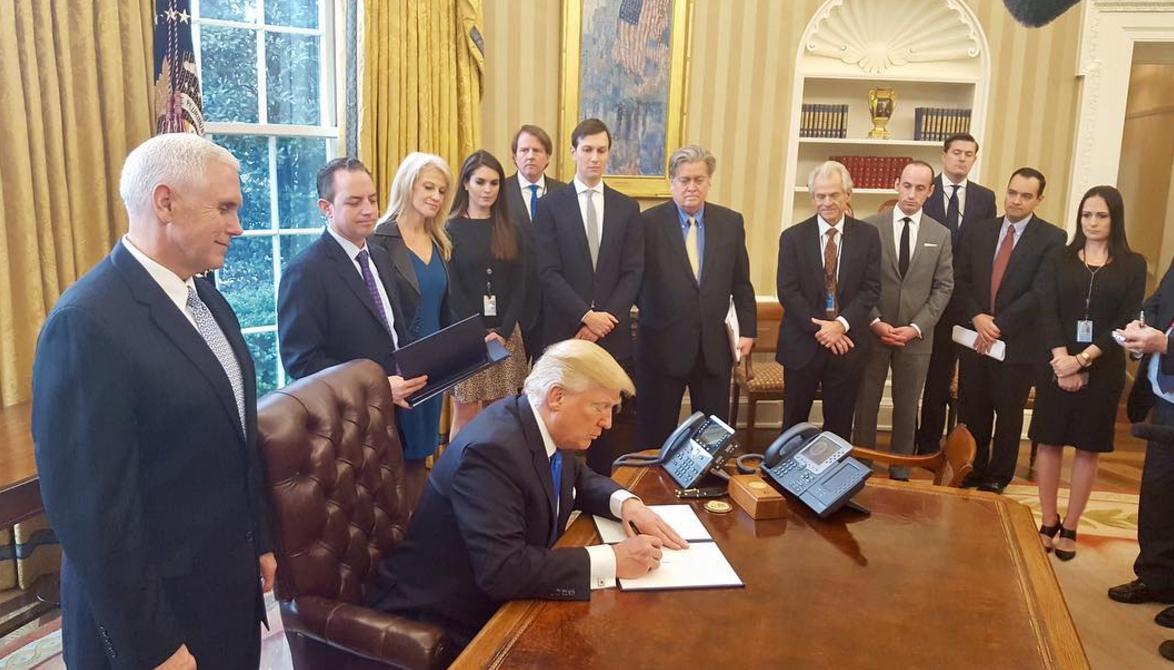US President Donald Trump’s threats to restrict foreign imports with a view to creating jobs for Americans have caused trepidation across the globe amid fears that he could cause chaos in global trade and shipping.
Trump’s propensity toward protectionism could also have repercussions for the United States in the long run because if, as Trump has threatened, border taxes are imposed, it will trigger a trade war that could be pernicious for the world’s most powerful economy. An example: Trump’s move to curb the “flood of cheap imports” of foreign steel could compel other countries to hit back at US exports of steel products, creating major obstacles for American products in world markets.
That, in turn, could also hit shipping to and from the United States, a fear spreading among some US port operators.
The Port of South Louisiana, for example, is closely monitoring the situation and hoping that such a crisis would never occur.
After axing the Trans-Pacific Partnership (TPP), which former President Barack Obama had unsuccessfully tried to get through Congress, Trump said that he would drastically change the North American Free Trade Agreement (NAFTA), though the other NAFTA partners, Canada and Mexico, have signalled their displeasure because of the possibility of additional tariffs being imposed on imports into the US.

Subjecting NAFTA to a rigorous renegotiation would have an adverse effect on the economies of many states in the US. The state of Louisiana’s trade with Canada and Mexico, for example, has grown as trade between Canada, Mexico and the USA jumped from nearly US$295 billion in 1993 to almost US$800 billion in 2016.
NAFTA has benefitted Louisiana, which shipped some US$5.9 billion worth of goods to Mexico in 2015. A 20% tariff on Mexican imports, as Trump has threatened, could prompt Mexico to take reciprocal action, which could hit Louisiana’s exports. Don Pierson, Louisiana’s Economic Development Secretary, has been talking about “significant ramifications” for the state’s businesses and companies if existing NAFTA arrangement is changed. Experts argue that the more Louisiana exports, the more jobs it will create for people needed to manufacture the exported products.
Louisiana’s two major trade points – Baton Rouge and New Orleans – have a lot to lose if Trump imposes border taxes. Indeed, exports have provided the silver linings in the otherwise dark economic clouds hovering over the state which has been badly hit by falling oil prices.
European shipping lines have also been alarmed that Trump’s actions could unleash an unnecessary trade war.
Maersk, the world’s largest container line, is closely following developments that could culminate in a trade war with China.
While Maersk has not been unduly affected by Trump’s aversion to multilateral trade deals, it is closely monitoring Trump’s anti-China trade rhetoric. Soren Skou, Maersk’s CEO, has been telling journalists that a trade war with China would have a “very negative effect” on the shipping line’s business.
Maersk predicts that the global shipping market would grow by 2 to 4% in 2017, generating an estimated profit growth from its freight business by at least US$1 billion; however, a US-China trade war could put the forecast in disarray. A number of US-based analysts have calculated that a 10% tariff on Chinese exports to the US would result in a 25% decline in Chinese exports to the US, resulting in an economic growth decline in China of 1%. Likewise, a retaliatory Chinese imposition of tariffs on US products could result in a decline of a quarter of a percentage point in US GDP.
Protectionism and obstacles to free trade could not come at a more inappropriate time, particularly when the World Trade Organization has, so far, removed only 740 of the 3,000 trade restrictions still in place.
Charlene Barshefsky, a former US Trade Representative known internationally as the architect and chief negotiator of China’s historic WTO agreement, recently stated at the Asia Society in New York, during a panel discussion on recommendations to the Trump administration on dealing with China, that some 95% of the world’s population and 80% of global consumption are to be found outside the US, with Asia-Pacific providing future growth.
“Some 11.6 million jobs are supported by exports from the US, and 300,000 small businesses export around the world from every state in the United States. China’s entry into a global economy has yielded very important benefits to China, for the US and for the world. China is the world’s second-largest importer after the US. It is the second-largest export market for US goods, our manufactured products and agriculture. The growth in services trade with China is very robust and accelerating and two-way investment between the countries is very healthy,” noted Barshefsky.
At present, the US economy is strong and expected to be on the growth path for at least a year or two, a healthy sign for companies involved in containerized imports. Indeed, container rates as of January 2017 were at a 20-month high, according to Drewry Shipping Consultants.
However, a strong dollar combined with sluggish overseas demand could hit US containerized exports in 2017 and possibly 2018. Retaliatory tariffs slapped by China and other nations on US exports can further weaken US exports.
Overcapacity in the shipping industry is affecting charter rates, keeping them stuck below operating expense levels and leaving hundreds of ships idle. Trump’s protectionist policies could make matters worse.
Meanwhile, fears of US protectionism has sent many US traditional allies in Europe scrambling for new friends and markets, with German Chancellor Angela Merkel emphasizing in a telephone conversation with Chinese Premier Li Keqiang the need for free trade and a stable world trade order. The Europeans are now taking Trump “seriously and literally,” as one German industrialist told Asia Cargo News at the recent Heimtextil show in Frankfurt. Indeed, he said that Trump’s threat to impose punitive tariffs on Mexican and Chinese products would easily lead to a trade war that will inflict “heavy collateral damage” on world trade.
By Manik Mehta
International Correspondent | New York



